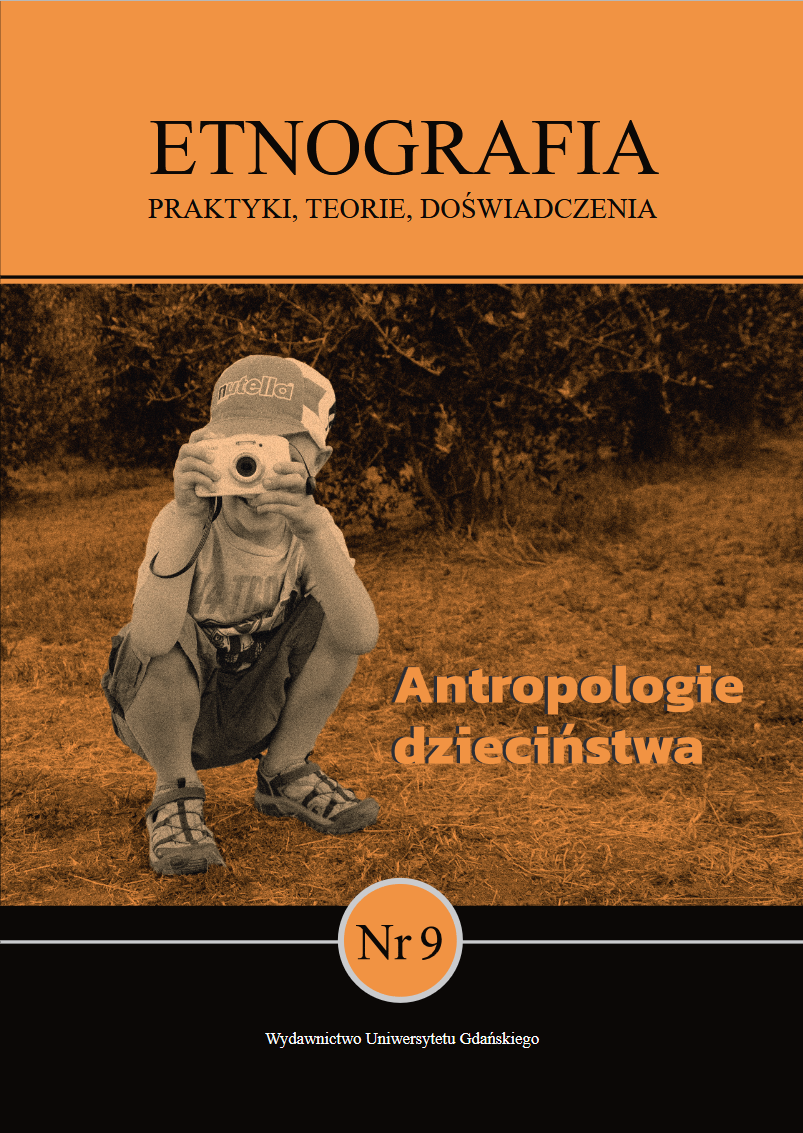Therapeutic discourses and practices as neoliberal technology of power. Auto-ethnographic case study of “Szkoła Edukacji”
DOI:
https://doi.org/10.26881/etno.2023.9.06Słowa kluczowe:
Interpellation, post-Fordism, School of Education (Szkoła Edukacji), therapeutic culture, ideology, privatisationAbstrakt
Downloads
Bibliografia
Althusser, L. (1971). Ideology and ideological state apparatuses (Notes towards an investigation). In: Lenin and philosophy and other essays (pp. 142–147, 166–176), translated by B. Brewster. New York–London: Monthly Review Press.
Anderson, L. (2006). Analytic autoethnography. Journal of Contemporary Ethnography, 35(4), 373–395.
Baran, P.A., Sweezy, P.M. (1966). Monopoly capital: An essay on the American Economic and Social Order. New York–London: Monthly Review Press.
Barszczewski, J.P. (2016). Przymus kreatywności jako źródło cierpień. Życie i praca obliczu neoliberalnej polityki zarządzania. Gdańsk: Wydawnictwo Naukowe Katedra.
Beaud, S. Pialoux, M. (1999). Retour sur la condition ouvrière. Enquête aux usines Peugeot de Sochaux-Montbéliard. Paris: Librairie Arthème Fayard.
Bobako, M. (2017). Islamofobia jako technologia władzy: studium z antropologii politycznej. Kraków: Universitas.
Boltanski, L., Chiapello, E. (2007). The new spirit of capitalism, translated by G. Elliott. London–New York: Verso.
CEO (2024). Ocenianie kształtujące. Website of the The Center for Citizenship Education. https://sus.ceo.org.pl/ocenianie-ksztaltujace/ocenianie-ksztaltujace-2/ [accessed: 4.01.2024].
Cleaver, H. (2004). On schoolwork and the struggle against it. https://libcom.org/library/harry-cleaver-on-schoolwork-and-the-struggleagainst-it-treason-pamphlet [accessed: 20.06.2023].
Dunn, E. (2004). Privatizing Poland: Baby Food, Big Business, and the Remaking of Labor. London: Cornell University Press.
Foucault, M. (2009). Security, territory, population.
London: Palgrave Macmillan.
Foucault, M. (2010). The government of self and others. Lectures at the Collège de France 1982–1983, translated by G. Burchell. Basingstoke: Palgrave Macmillan.
Gardawski, J. (ed.) (2009). Polacy pracujący a kryzys fordyzmu. Warszawa: Wydawnictwo Naukowe Scholar.
Gardawski, J., Mrozowicki, A., Burski, J., Czarzasty, J., Karolak, M. (2022). Polacy pracujący w czasie Covid-19. Warszawa: Wydawnictwo Naukowe Scholar.
Ilyenkov, E. (1974). Didaktika i dialektika. Вопросы философии, 2, 75–79.
International network of student organisations Universities at War (no date). Our common statement. https://universitiesatwar.wordpress.com/2024/07/22/our-common-statement/?fbclid=IwY2xjawFLx5VleHRuA2FlbQIxMQABHcsczha6YhVWxvjnvrpKdl1iqhEfKvb4lz1x1KZE84mlm93AvAR2Cxp4jg_aem_WWS2Blj5gsa4s6t4y6FRxQ [accessed: 17.09.2024].
Harvey, D. (2005). A brief history of neoliberalism. New York: Oxford University Press.
Illouz, E. (2008). Saving the modern soul. Therapy, emotions, and the culture of self-help. Berkeley–Los Angeles–London: University of California Press.
Illouz, E. (2010). Cold intimacies: The making of emotional capitalism. Cambridge: Polity Press.
Illouz, E. (2020). Resilience. The failure of success. In: The Routledge Handbook of Global Therapeutic Cultures, D. Nehring, O.J. Madsen, E. Cabanas et al. (Eds.). New York–London: Routledge.
Jacyno, M. (2006). Kultura terapeutyczna a demokratyzacja życia. In: M. Głowacka-Grajper, E. Nowicka (eds.), Jak się dzielimy i co nas łączy? Przemiany wartości i więzi we współczesnym społeczeństwie polskim. Warszawa: Zakład Wydawniczy Nomos.
Jacyno, M. (2022). Wprowadzenie. In: S. Beaud, M. Pialoux, Powrót do kwestii robotniczej: badania socjologiczne przeprowadzone w fabryce Peugeota w Sochaux-Montbéliard, translated by K. Marczewska. Warszawa: Oficyna Naukowa.
Janik, M. (2008). Podmiot jako centralne pojęcie ideologii. Na marginesie politycznego dyskursu nowoczesności. Forum Oświatowe (numer specjalny), 20, 65–76.
Kacperczyk, A. (2014). Autoetnografia – technika, metoda, nowy paradygmat? O metodologicznym statusie autoetnografii. Przegląd Socjologii Jakościowej, 10(3), 32–75.
Matys, M. (2020). Rekiny, ale łagodne. Opowieść o Polsko-Amerykańskim Funduszu Przedsiębiorczości. Warszawa: Enterprise Investors.
Montag, W. (1995). The soul is the prison of the body Althusser and Foucault 1970–1975. Yale French Studies, 88, 53–77.
Potulicka, E., Rutkowiak, J. (2010). Neoliberalne uwikłania edukacji. Kraków: Oficyna Wydawnicza Impuls.
Poulantzas, N. (1985). Klasy społeczne i ich rozszerzona reprodukcja, translated by T. Popławski, M. Kowalska. Colloquia Communia, 2.
Reckwitz, A. (2017). Odkrycie kreatywności. O procesie społecznej estetyzacji, translated by K. Kończal, Z. Sucharska. Warszawa: Narodowe Centrum Kultury.
Rose, N. (1998). Inventing our selves. Psychology, power, and personhood. Cambridge: Cambridge University Press.
Sadura, P. (2017). Państwo, szkoła, klasy. Warszawa: Krytyka Polityczna.
Service of the Republic of Poland (no date). Szkoły i uczniowie według organów prowadzących. https://dane.gov.pl/pl/dataset/212 [accessed: 4.01.2024].
Sroczyński, G. (2019). Czy ta, czy inna partia – my już zostaniemy państwem półperyferyjnym z beznadziejnymi szkołami i szpitalami, Gazeta.pl, https://next.gazeta.pl/next/7,151003,25280346,jacyno-czy-ta-czy-inna-partia-my-juz-zostaniemy-panstwem.html [accessed: 15.10.2024].
Szarecki, A. (2017). Kapitalizm somatyczny. Ciało i władza w kulturze korporacyjnej. Warszawa: Wydawnictwa Drugie.
Szkoła Edukacji (2023a). Website of the School of Education. https://szkolaedukacji.pl/ [accessed: 20.05.2023].
Szkoła Edukacji (2023b). Detailed schedule of classes. Website of the School of Education. https://szkolaedukacji.pl/wp-content/uploads/2023/07/Przykladowy-szczegolowy-plan-zajec.pdf [accessed: 20.05.2023].
Szkoła Edukacji (2023c). Framework schedule of courses. Website of the School of Education. https://szkolaedukacji.pl/wp-content/uploads/2023/03/ramowy-rozklad-zajec.pdf [accessed: 20.05.2023].
Szkoła Edukacji (2023d). Syllabus for the academic year 2022/2023. Website of the School of Education. https://szkolaedukacji.pl/wp-content/uploads/2022/07/sylabusy_2022-2023docx.pdf [accessed: 20.05.2023].
Waniek, K. (2023). Kilka uwag o dobrym życiu w biograficznym doświadczeniu i jego nadmiernej terapeutyzacji. Studia Socjologiczne, 1(248), 31–58.
Woliński, X. (2022). Gdzie jest klasa robotnicza? Mały Format, 11–12.
Opublikowane
Jak cytować
Numer
Dział
Licencja
Czasopismo wydawane jest na licencji Creative Commons Uznanie autorstwa-Na tych samych warunkach 4.0 Międzynarodowe.

 Uniwersyteckie Czasopisma Naukowe
Uniwersyteckie Czasopisma Naukowe








